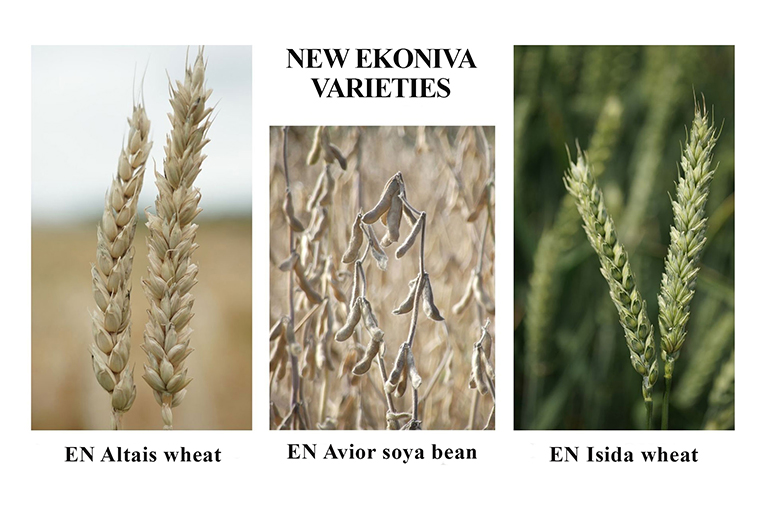EkoNiva expands portfolio with in-house bred winter wheat and soya bean varieties
Press-centre / News,
New EN Altais, EN Isida winter wheat varieties and EN Avior soya bean variety bred by EkoNiva’s Plant Breeding and Seed Maintenance Centre have been entered into the State Register of Plant Breeding Achievements in 2024. They are allowed for use in the Central Black Soil and Middle Volga regions.

The main difference between the new winter wheat varieties and those already available in EkoNiva-Semena's portfolio is that the spike of the former is awnless. The novelties are recommended for intensive cultivation and in terms of baking quality belong to the class of valuable wheat. The varieties feature high winter hardiness and plasticity, good lodging resistance.
‘It is important to note such advantages of the new varieties as resistance to grain shattering and sprouting, good tillering capacity, increased milling yield. Another significant characteristic is the comprehensive resistance of EN Altais and EN Isida to major fungal diseases under field conditions’, says Andrey Zvyagin, Originator of Varieties and Head of Cereal Breeding and Seed Maintenance Department at EkoNiva.
The maximum yield of EN Isida reached 12.44 t/ha at Zashchitnoye, Kursk oblast, in 2023. At Oboyan State Variety Testing Plot, the variety produced 10.68 t/ha. The decent results were also obtained in the Middle Volga region in 2022 — EN Isida wheat yielded 7.1 t/ha in Tatarstan, 8.2 t/ha — in Ulyanovsk oblast.
The record output of EN Altais variety in the last agricultural season — 12.63 t/ha — was also achieved in Kursk subdivision of the Group. At Oboyan State Variety Testing Plot, the variety yielded 10.72 t/ha. In Tatarstan and Ulyanovsk oblast in 2022, the crop of EN Altais winter wheat amounted to 7.2 and 6.7 t/ha respectively. The protein content in the EN Isida and EN Altais varieties reaches 15%, which indicates high baking qualities.
The vegetation period of EN Isida is 281-307 days; the variety has a high potential for productive tillering, is relatively tolerant to early and late sowing dates. EN Altais wheat matures in the period from 273 to 295 days. It is distinguished by a large well-filled grain and high gluten content, up to 30%. EN Avior, an early-ripening soya bean variety, has also been added to the State Register. It is regionally adapted for the Central Black Soil Region.
‘It is important that the EN Avior variety was created for the first time as part of a breeding programme involving photoperiodic response genetics with the use of molecular markers’, emphasises Vladislav Rosenzweig, one of the Originators of the variety and an EkoNiva Plant Breeder.
The new soya bean variety can be a good predecessor to winter crops, has high resistance to lodging and is characterised by a high protein content of 39-43%. The average yield of EN Avior exceeds 3.5 t/ha. The crop heat units required for ripening is 2,300 °C.
‘The recognition of our varieties by the State Variety Testing Commission proves that we have chosen the right breeding programmes and that our work is valuable and useful. Our plant breeders create competitive marginal varieties capable of producing stable yields in different agroclimatic conditions’, stresses Vitaliy Voloshchenko, Director of Plant Breeding and Seed Maintenance Centre of EkoNiva Group.
Today, EkoNiva’s portfolio comprises 9 winter wheat and 4 soya bean varieties of in-house breeding. Several more varieties have been submitted for state trials to the State Variety Testing Commission. In addition to the breeding programmes for winter wheat and soya beans, the company has also commenced works on developing new varieties of lentils, spring soft wheat, lupine and chickpeas.